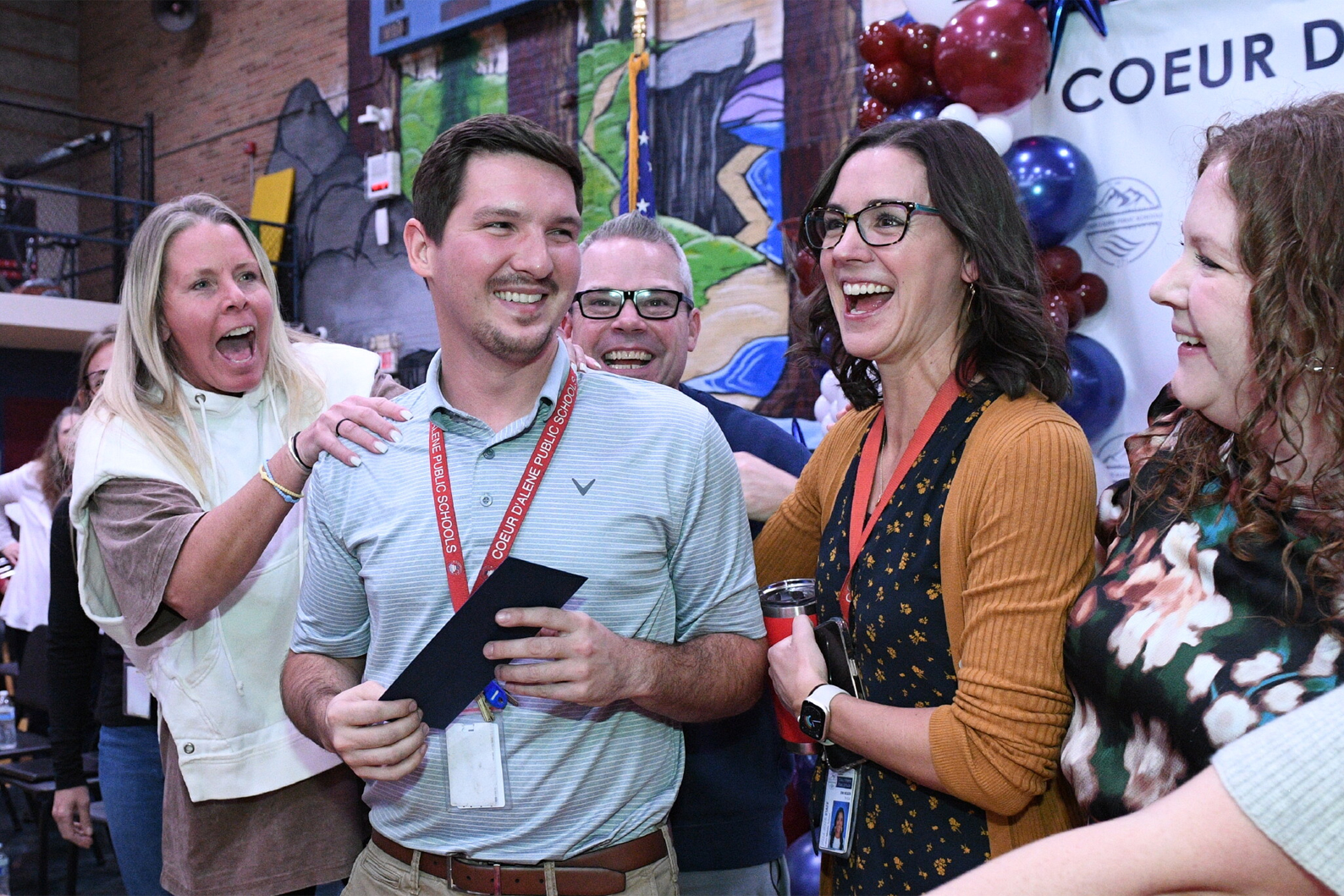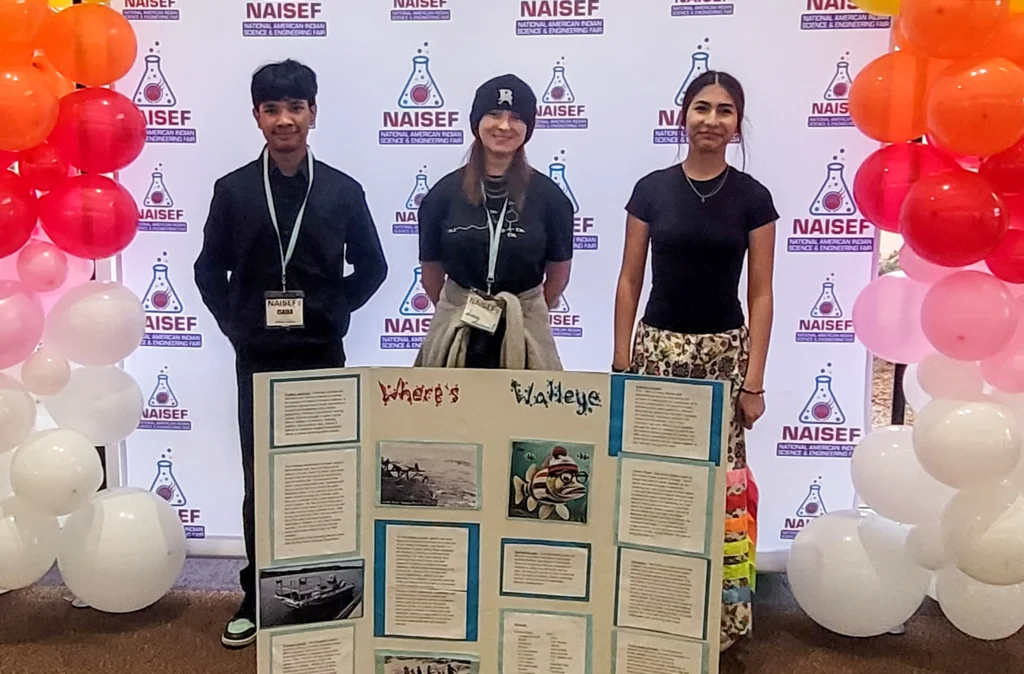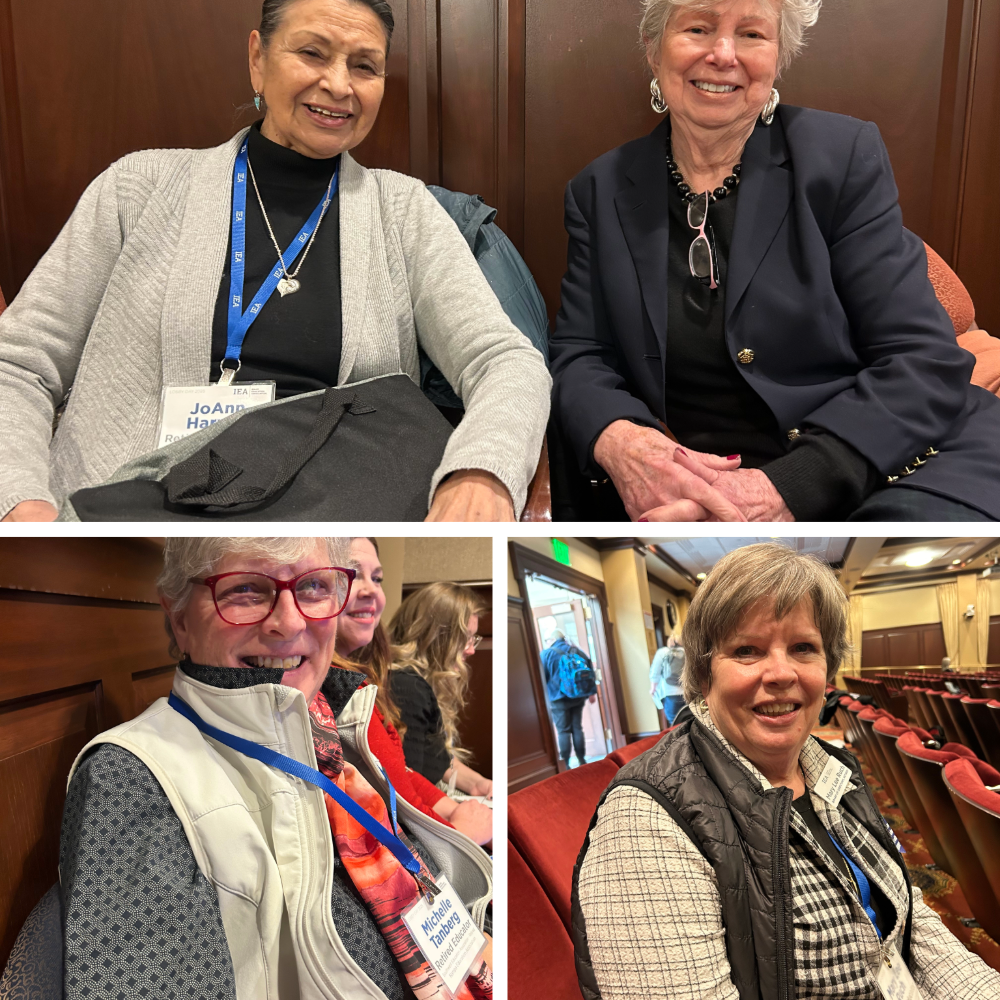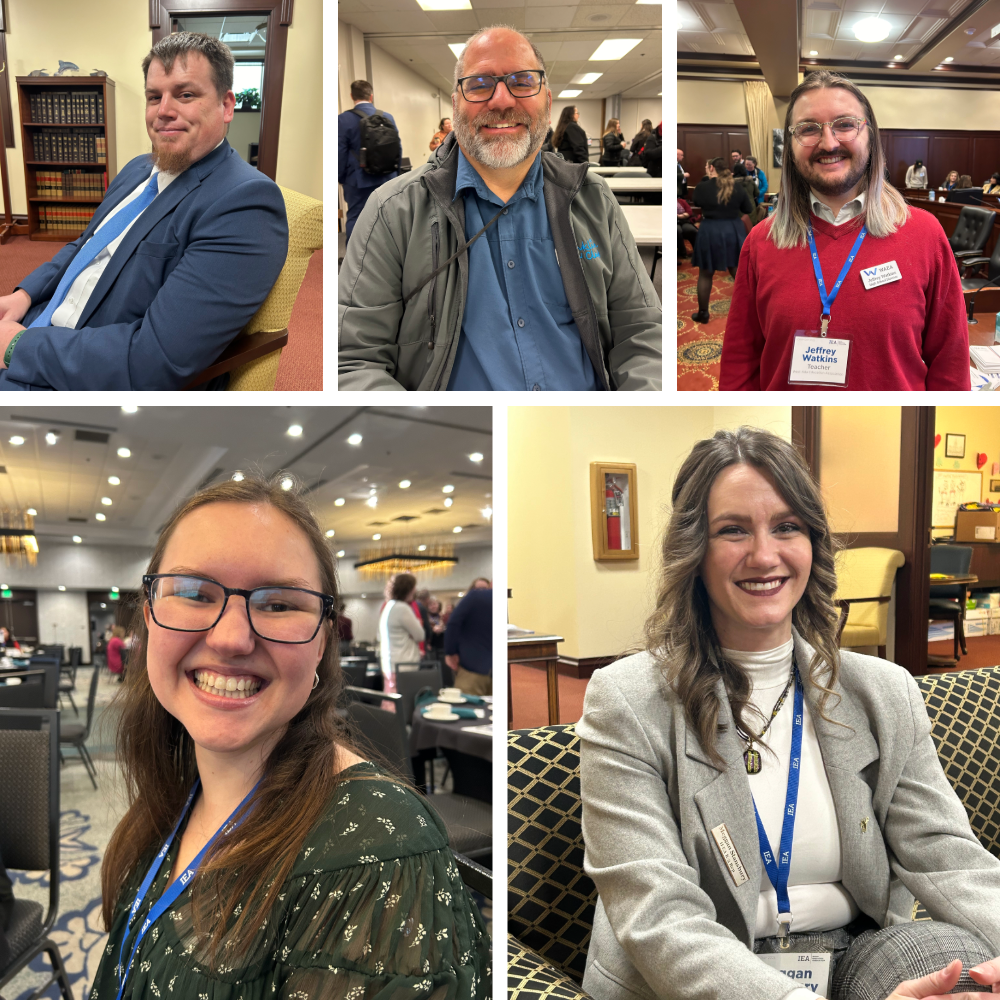In late November, Marcus Ross walked into a school assembly at Lakes Middle School in Coeur d’Alene to celebrate student success. But this was no ordinary assembly. Instead, he entered an awards ceremony where Idaho Superintendent of Public Instruction Debbie Critchfield was waiting to congratulate him – along with an entire school full of cheering students and educators.
Ross was surprised with the Milken Educator Award, which has been dubbed “The Oscars of teaching,” and is given by the Milken Foundation. Ross was one of up to 45 educators who will receive the honor this year. The award includes a $25,000 unrestricted cash prize.
Idaho Education Association sat down with Ross to discuss his award and the innovative teaching methods that have won him accolades. This interview has been heavily condensed and edited for clarity and brevity; to watch the full interview, click the link below.
IEA: Tell me about the award. Did you have any idea it was coming?
Ross: I didn’t – I had no idea. I mean, I’m very, very honored. I’m very shocked. I thought that we were just going to have a quick assembly celebrating success of our students. And then next thing you know, my name’s being called.
IEA: It’s pretty awesome to get “the Oscars of teaching.” How did you decide to become an educator?
Ross: I grew up where I work now. All my teachers were fantastic. In third grade, I had a teacher that just really changed my perspective on life, and changed my perspective on the impact that a teacher can truly have on his students. I was like, “I think this is what I want to do. I want to also have a positive impact on people’s lives and watch them grow into these amazing humans.” And from there, that was my goal. So I went to Boise State University and got a job back at my old school.
IEA: Was it your plan to teach at the same middle school that you attended?
Ross: Yep. Lakes Middle School was the only job I applied for when I graduated college, and I’m lucky that I got it.
IEA: Tell me what it’s like teaching middle school students.
Ross: I think middle schoolers are misunderstood. I think that they have such big hearts, and they are trying to navigate through such interesting times in their lives, and they’re going through so many changes that if you just sit down and listen to what exactly they are feeling and thinking … Like, “Oh my gosh, I understand why you maybe had that outburst.” Every day is wonderful. Every day is different. They make me laugh all the time. They like to push my buttons occasionally, too, but I don’t think I would do any grade ever again.
IEA: Can you tell me a little bit about your teaching philosophy? How did you develop this particular teaching style that you’re now being recognized for?
Ross: The first thing I always do when I first meet a student is take the time to get to know them inside and out. Who are you? Who am I meeting? Who’s in my classroom every day? How do you learn? What’s your best ability to learn? Where do you like to sit? How do you like the atmosphere?
And then we also need to build a community within that classroom, right? And so I spend so much time speaking about the idea of when we’re all in here, we get to live life together in this classroom. Everyone deserves to be heard, respected, understood. And the number one thing that I always say is that you have to be kind. I don’t request respect from them. I live my life, loving them and caring for them, and then I just kind of earn that respect from them as we go. And then from there, honestly, the learning comes, right?
IEA: One of the reasons you were selected for the award is because of your innovative teaching techniques. I’m wondering about some of those techniques and how you developed them.
Ross: I use this thing called Phenomenal Teaching as a framework of how I plan a lesson. And it’s really thinking about how I can make sure that students are doing as much of the teaching as possible, and I am the facilitator. How can I guide the questions to ensure that the students are teaching each other and answering my questions, instead of coming straight out and saying, “This is how you do it. Now, practice 20 questions.”

Ross addressed the assembly. “I went to this school, I was raised in this district, and I’ve been in public school my whole life,” he said. “I absolutely love this school, I love the staff I work with, I love you guys, and I love teaching you.” Photo courtesy of the Milken Family Foundation.
Four years ago, I created a tier system. It’s really just four main categories: interactive listening, independent time, partner time, group work time. Each tier has a color system. I can quickly transition through activities as fast as possible to make sure that they are active listening. When I need them to, I just change the color and they’re instantly quiet. It helps me navigate how much independent time is taking place in class to make sure that they also have chance to be social and the chance to share their thinking with others, because I don’t want them quiet the entire period. That’s not fun.
That has now blossomed to a districtwide thing, and teachers in our buildings use it. And teachers in different states are using the tier system now, and it’s pretty cool to watch it blossom nationwide.
IEA: Tell me how that came about.
Ross: There are phenomenal teachers around me, fantastic teachers who are my mentors, who have helped me get here, and I just started watching them teach. I watched what I enjoyed, or what I would do differently. I started doing this thing called Lab Host, where I would go and observe other classrooms and find things I could implement into my own classroom.
When I found something I wanted to do, I just implemented it — because until you try something, you’re never going to see if it works. Teachers started coming in and watching me. And then throughout the years, more and more people were reaching out to come watch me — I guess they enjoyed how I taught, and the tier system really did bring in an audience into the classroom.
IEA: I read that you have had more than 100 educators come in and observe you, is that right?
Ross: It’s maybe around 100, maybe a little more. I wish we all could get recognized. Because, gosh, there are some amazing people out there.
IEA: One of the things you’re known for is your consideration for students, their feelings and their welfare. Why is that so important to you?
Ross: I 100% believe in education. I believe that my job is to teach math. That is my number one job. But on the other side of that, life is so short, and it could switch in a minute. And so if I have a student who comes in and they put their head down, or they come in and I can tell that they are just exhausted, the last thing I want to do is say, “You need to do your math.” If you don’t get take the time to understand why a student’s coming in the way they are, you’re going to break that relationship very, very fast, and they’re not going to trust you. And so I make sure I make it a point to check in with every single one of my students before I start class. And if they miss math that day because they needed to put their head down for a second, they missed math that day. I have found that in the long run, they end up rising to the occasion.
They need to be treated like humans, and so that’s where the relationship piece comes in. Math is important, but they’re going to grow up, and they need to know how to navigate life too.
IEA: Tell me about the Kind Club.
Ross: COVID hit during the end of my first year of teaching. It made me very, very sad to kind of lose my little family that I created, and I was never going to see them again, and I didn’t get to say goodbye. And so the next year, I knew there was something I wanted to do to create this positive environment in our school, that no matter what if something happened, they still remember the love that all the teachers at the school have.
I found another teacher who, years ago, had an idea for Kind Club, and so we teamed up. It started off very, very small. And our whole purpose was, we’re just going to do good every day. We’re going to show up and we’re going to put positive messages around the school. And then it turned into noticing teachers or finding a student who may have had a hard time. Now we’re going to wake up in the morning and stand outside to welcome all the students showing up to school, and we’re playing music, and we’re going to hold signs that say, You’re Awesome, or You’re Amazing, or Be Kind. We have seen a drastic change and how students treat each other and how they respond to each other when there is disagreement.
IEA: How do you encourage more parental involvement?
Ross: At the middle school level, I think that parent communication really does drop quite a bit. They want their child to be more independent, but yet they’re not necessarily seeing everything that’s taking place at school. We can help support them and their child when they are in need. And I find that the parents tend to reach out more when they find their child struggling, because they trust me, because I’ve been communicating with them. So I email every week. I try to send out as much positivity as I can. I hand write letters to my students to send home with their parents around testing time. And now we have a pretty strong parent support system that will actually help put on assemblies now, like grade point average assemblies to celebrate GPAs. And more and more parents are getting involved, which is fantastic. That’s what we want.
IEA: There’s a significant number of teachers who quit within the first five years. I’m wondering how you avoided that and if you have any words of wisdom for people who might be struggling early in their careers.
Ross: You really do need to build knowledge: OK, where am I struggling most? Is it my behavior management? Is it how I run these lessons? Maybe it’s because the students aren’t impressed with the concept, so then they’re getting off task, right? You have to find a system that works for you and find that support system. I mean, I would not be here if I didn’t have the support system. My mentors have helped me get here, and I still go for to them for everything.
The second thing I would say is: every day is a new day, right? That lesson bombs, OK, fine. Try again next time. There’s always that next day. I just make sure that I tell my students every day, “Let’s be in this moment together. Because I’m going to miss you, you’re going to be off and you’re going to be living your life and I’m not going to have you anymore.”
It is a hard job. You have to wake up every morning and say, “It is a new day, and the kids are going to wake up and it’s going to be a new day for them, and you’re going to say good morning to them and say, ‘I’m happy you’re here.’ ” I’m still young, but that’s how I’m making it right now.
IEA: It sounds like you try to keep up those relationships even after they leave the classroom.
Ross: Yeah, I try to as much as possible. It’s so hard because you’re like, I want you to go spread your roots, like, go and take this knowledge that I was able to give you, hopefully, and go be leaders. I try to go watch their games and sports and plays and concerts. Some of them have jobs now and I can go see them at their jobs, and I try to communicate with them as much possible through email. But it’s so fun to see them kind of just blossom and no longer need me, because they are making it. My first group actually just graduated from high school.
IEA: How long have you been a member of the union?
Ross: I joined two years ago. I knew that it was something that I wanted to be a part of. I just love the education system. It takes a good heart, a special heart, to be in this career. And I want to be able to a part of that community of individuals who want to just make the world a better place, because I truly do believe that every single person I’ve ever met in this career is the most phenomenal individual. Those are the people I want to surround myself with who are going to make me better and push me to also keep that energy to continue spreading love and kindness in this world. So, yeah. I mean, I’m going to be a part of it as long as I can.
IEA: I have to ask you about your school picture.

Marcus Ross
Ross: So my eighth grade hallway, we’re a very tight community, and we like to do themes every year. And so we decided to do nerds that year. I specifically remember one of our staff
members in the front office said, “You need to change your picture because you need a professional one, just in case.” And in my mind, I was like, It’s just a school picture. It’s just on my ID cards. And that just so happened to be the same year that I won district teacher of the year. I was like, now I understand why she wants a professional one.
IEA: Part of this award is that you got a pretty significant unrestricted cash prize. Do you have any plans for it yet?
Ross: You know, I still get pretty emotional with it. I’m so extremely honored, and there are so many people out there in the world, and so many of my students who are struggling to just make it by and to have food on the table and warm clothes and to feel safe. I think my first thought was, All right, how can I give this back to my community?
It just so happened to come at the right time for me, too. I mean, I had a pretty big injury last year and medical bills. But at the same time, I really would love to start a foundation and try to just come up with a way to give back to students in our community, in our district who are doing good, who are being kind, who are being generous to others. I would love to just continue paying it forward.




